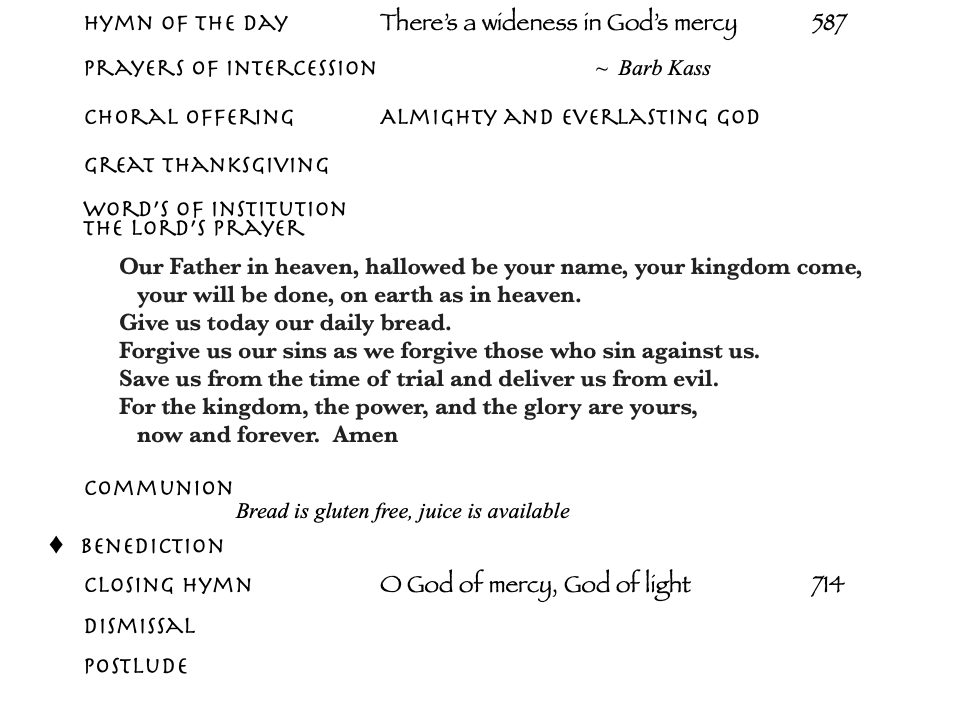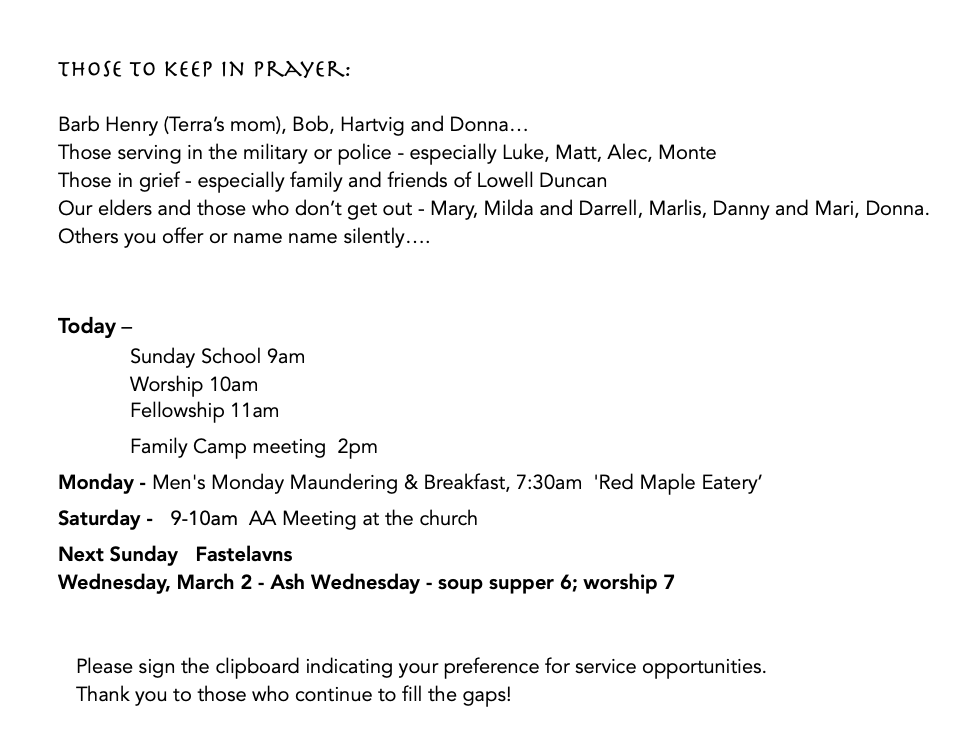Audio Recording
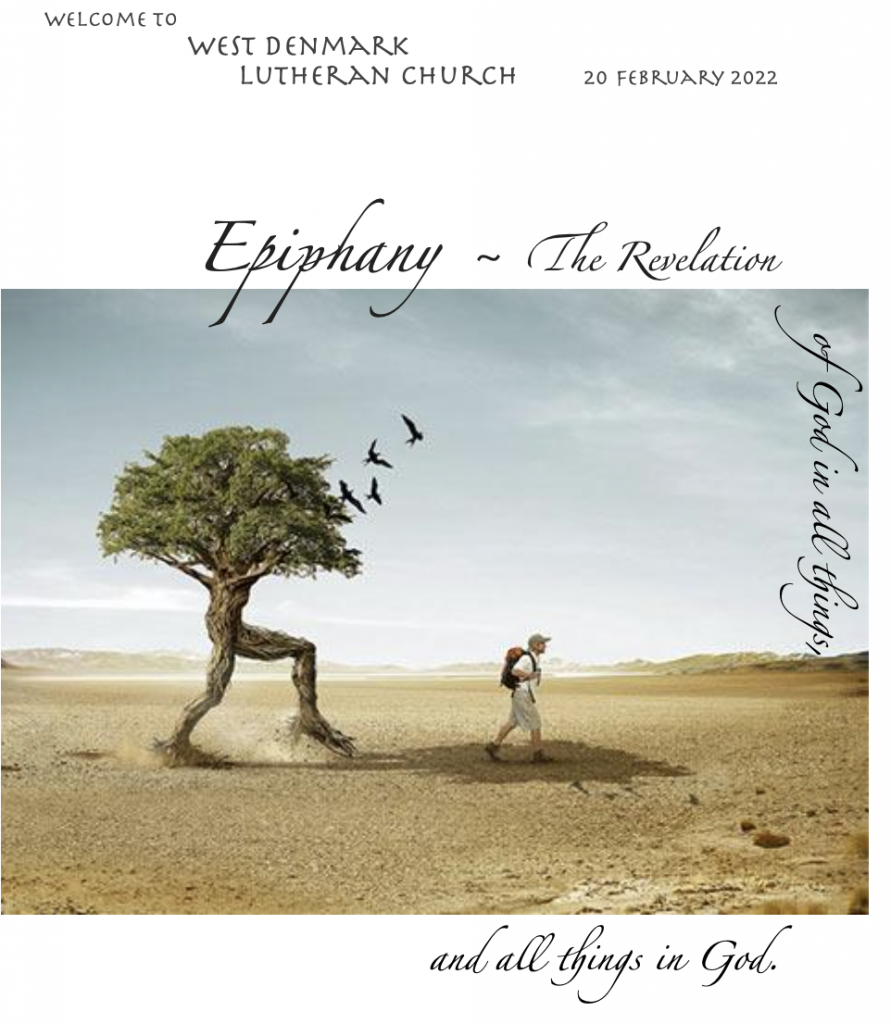
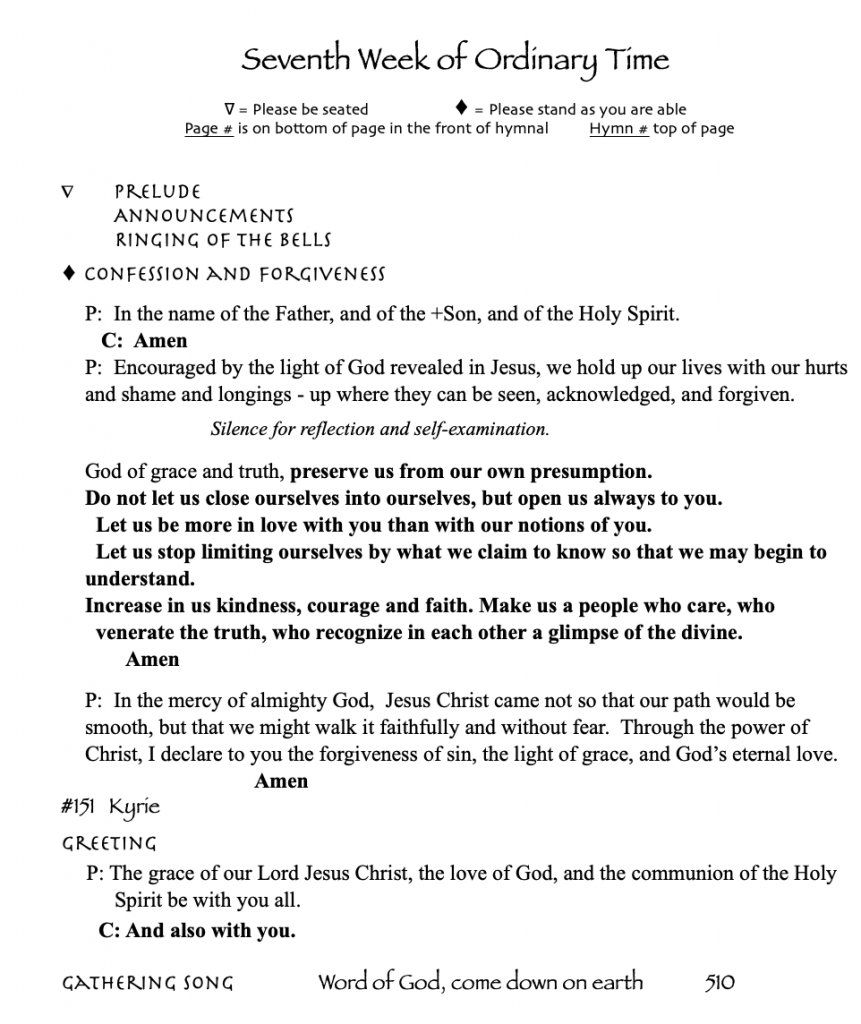
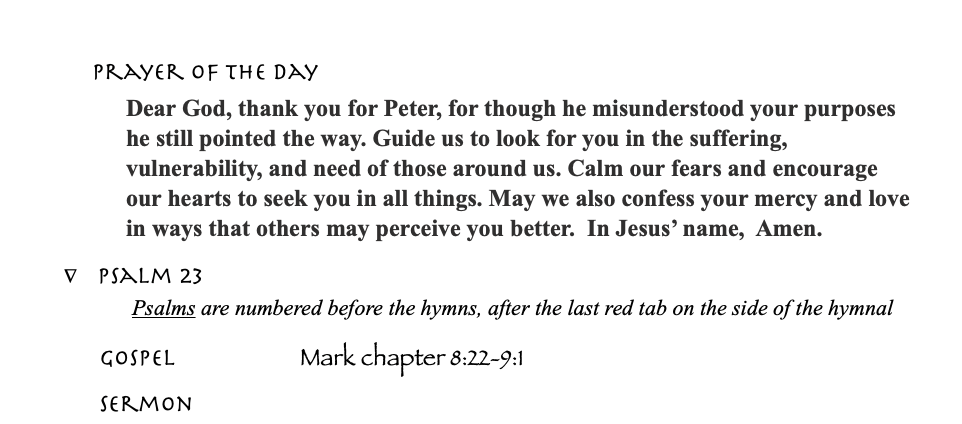
Mark 8: 22-9:1
[Jesus and the disciples] came to Bethsaida. Some people brought a blind man to him and begged him to touch him. He took the blind man by the hand and led him out of the village; and when he had put saliva on his eyes and laid his hands on him, he asked him, “Can you see anything?” And the man looked up and said, “I can see people, but they look like trees, walking.” Then Jesus laid his hands on his eyes again; and he looked intently and his sight was restored, and he saw everything clearly. Then he sent him away to his home, saying, “Do not even go into the village!”
Jesus went on with his disciples to the villages of Caesarea Philippi. [If you remember from the previous weeks’ maps, this is Philip’s territory. Though technically he’s a Jew, his rule is very friendly to Rome. Today Caesarea Philippi is an archaeological site in the Golan Heights and is administered by Israel as a national park.]
On the way Jesus asked his disciples, ‘Who do people say that I am?’ And they answered him, ‘John the Baptist; and others, Elijah; and still others, one of the prophets.’ He asked them, ‘But who do you say that I am?’ Peter answered him, ‘You are the Messiah.’ And he sternly ordered them not to tell anyone about him.
Then he began to teach them that the Son of Man must undergo great suffering, and be rejected by the elders, the chief priests, and the scribes, and be killed, and after three days rise again. He said all this quite openly. Peter took him aside and began to rebuke him. But turning and looking at his disciples, he rebuked Peter and said, “Get behind me, Satan! For you are setting your mind not on divine things but on human things.”
He called to the crowd along with his disciples, and said to them, “If any want to become my followers, let them deny themselves and take up their cross and follow me. For those who want to save their life will lose it, and those who lose their life for my sake, and for the sake of the gospel, will save it. For what will it profit them to gain the whole world and forfeit their life? Indeed, what can they give in return for their life? Those who are ashamed of me and of my words in this adulterous and sinful generation, of them the Son of Man will also be ashamed when he comes in the glory of his Father with the holy angels.”
`And he said to them, “Truly I tell you, there are some standing here who will not taste death until they see that the kingdom of God has come with power.”
There is so much good stuff in here. By rights, this reading should be divided into about four sermons. But in order to get to Easter in the gospel on Easter in the calendar we have to take big gulps and soldier on.
I tend to start sermons with geography or history or some point of science because those connections are of interest to me and because I think we can never know enough about the setting, or the times, or culture of which we are reading. While I absolutely believe these writings are inspired, I am equally convinced that they were not written for us in the 21st century, and are not equally applicable to us – and that learning bits and pieces about the ancient world can only help.
So, a bit out of order, I’m beginning with Caesarea Philippi:
It was about a 25 mile walk north from Bethsaida on the Sea of Galilee to Caesarea Philippi and the base of Mt. Hermon. In our day it’s an archaeological site in the Golan Heights administered by Israel as a national park.
It’s also, still, the location of one of the largest springs feeding the Jordan River. This abundant source of water made the area very fertile and, therefore, an attractive spot for religious worship. The ancient city was adjacent to the spring, a grotto, and related shrines dedicated to the Greco Roman god Pan, the god of shepherds and flocks, the god of desolate places, and fear (hence our word ‘panic’).
This area had been annexed to the Kingdom of Herod the Great (who was Jewish by birth). In 14 AD, Herod’s son Philip changed the name of the Greek city to Caesarea in honor of the Emperor. The gospel of John’s Jesus says, “I am the Good Shepherd” and in Mark, Matthew, and Luke’s accounts, Jesus comes up to the area of Caesarea Philippi with its shrine to the shepherds’ god, Pan, and is transfigured before his disciples, and God’s voice is heard by them, “This is my beloved son, listen to him.” But it is only to three of the disciples and they are ordered to say nothing about it. The transfiguration will be told next week, but they’re up in this area, up in Greco Roman culture and religion and it adds a really interesting layer to what we hear in the gospels, because Mark was writing to this kind of gentile, the Pan worshippers. They aren’t the equivalence of our modern day “nones” – those who mark no religious belief on surveys. They believed in the pantheon of gods, the mythology we learned about in school. Jesus is a very, very different kind of God.
So, back to the beginning of the reading and to that point. As you may remember, earlier in the gospel, Jesus raised Jairus’ daughter from her deathbed. He healed the daughter of the Syrophoenician woman without ever seeing her. Jesus has healed without intending to – the woman with the flow of blood and later people in crowds who were healed by touching the hem of his garments. He has healed through his touch, with spittle, with mud, with his words. That is what people would expect of a god. Whether one is Jewish, Gentile, or unchurched, if you think healing is possible, God is powerful enough to do it blindfolded and with on hand behind her back.
A blind man is brought to Jesus. He put saliva on the man’s eyes and laid his hands on him. He asks, “Can you see anything?” And the man looks up and says, “I can see people, but they look like trees, walking.” Jesus lays his hands on his eyes again; and the man looks intently and his sight is restored, and he sees everything clearly. There’s no explanation of this mulligan. Jesus doesn’t credit the two tries needed to lack of faith, the disciples don’t ask about it. Jesus simply tells the man to keep it to himself – which is a growing theme – and then moves on.
But it’s interesting. And especially interesting in context with Jesus questioning his disciples about the gossip, about who people think he is. And then there’s Peter’s moment of glory which just as quickly dissolves. When will this image come into focus? Who is Jesus? We seem to get less clarity rather than more. Again, I think that’s the genius of Mark’s gospel. There was certainty and awe in the beginning. As we approach the pinnacle of the gospel in the transfiguration that certainty gradually melts away.
As Jesus comes down from the mountaintop he sets his face toward Jerusalem and the cross – and the image we have of this savior becomes difficult to make out. It’s hard to understand what he has come to accomplish. Despite all the displays of power Jesus performs, in the end we will see God’s greatest work of mercy and redemption revealed not in power but in weakness, not in glory, but in failure. This is not the way it’s supposed to go, this is not what happens to the gods of mythology.
Church teaching over the centuries has read the healing story of the blindman as a metaphor for the life of faith. It takes time for spiritual insight to come into focus. We can see in the rest of today’s reading that the disciples have understood little of Jesus’ identity and mission – partially, yes, hit and miss, yes. They rise to a moment and then flounder. The double take is no less true for us as we try and fail or stumble into recognition of God’s presence and activity. We are so tempted to create an ideal, an idol of what we want God to be, what we expect God to do, that we often miss what God might actually be doing.
Given their time with him, given what they have seen and heard, given the testimony of the crowds, what do his own disciples think? Jesus asks and Peter blurts out: “You are the messiah.” It sounds brilliant, until Jesus begins to explain what that means – “messiah” is the one who saves through weakness, not power; the one who redeems by suffering, not conquest; the one who gives his life as a ransom, rather than call others to die in battle for him. This is not what Peter imagined… or wanted.
It was hard enough to wrap their heads around the deeds of power, the teaching with authority and wisdom, but now to hear that Jesus’ greatest deed will be accomplished by death, by sacrificial love… that’s horrifying.
We’ve gotten used to the idea, but still don’t really believe it or hold onto it. Cultural Christianity focuses on the power, expects power.
We want God to conform to our sense of what a “God” should be – a loving divinity who always looks out for us, who is able to save us from whatever situation we find ourselves in, who restores to us the fortunes we believe we deserve. We desperately want God to do what we want, what we know we need, to answer to our will.
What do we do with a messiah who doesn’t conquer the world, but instead woos it with love? What do we do with a savior of these reversals of power?
There’s maybe no verse in Scripture that shows just how different the kingdom Jesus proclaims is from everyday life than this: “For those who want to save their life will lose it, and those who lose their life for my sake, and for the sake of the gospel, will save it.”
David Lose was a professor of mine who has written this: “So much of our effort and energy is geared toward saving our lives. From the work we do to put food on our tables to the children we have to preserve and extend our family. From the effort we put in to progressing through school or advancing in work to the networks of friends and colleagues we create to support us. From the homes we buy and security systems we install to the portfolios or savings and retirement accounts we build up.
We are, in a very real way, hard-wired by evolution to survive. We live in a culture that glorifies accumulation, beating the message into our heads that we’ve got to look out for ourselves and that our possessions are the key to our security, wellbeing, and happiness. And so, perhaps quite understandably, much if not most of what we do is to protect, sustain, and advance our lives; that is, to save ourselves.”
Yet Jesus invites us, commands us to let all of that go, to lose our lives for his sake and the sake of the gospel. This is not the God we want, or can bring into clear focus. It goes against reason and the inclination of the human heart.
We can actively defy the cultural logic of accumulation and intentionally deny ourselves in order to follow and depend on God.
We can also take Jesus’ words as descriptive rather than as a prescription. To realize that it’s only when life falls apart that we begin to recognize that we cannot save our lives and so come to depend on God. Sooner or later life will fall apart for each of us, whether because of death or illness or disappointment or whatever. At those times we realize that we are met by God there in our weakness, that we are actually helpless when it comes to saving our lives, and that our cultural illusions of self-sufficiency are just that – nothing, that God’s grace is all.
Like the blind man’s physical vision, our spiritual vision, our spiritual lives come in and out of focus. What’s required of us? What values and life choices flow from our faith’s convictions? How do we understand or follow the call to give ourselves away for the sake of the gospel? I suspect we answer these questions differently throughout our lives – as it should be. Living faith grows and changes, inspiration is a passing breeze or a headwind or leaves us in the doldrums. And though we don’t have shrines to Pan, we do have shrines aplenty calling for our allegiance, wooing us with short-lived promises always in contention with the gospel’s call.
So although these stories weren’t written about us, or for us – although they came into being 2000 years ago and the powers and principalities of the age have come and gone and come again in new forms… we find ourselves and our lives of faith in the pages among Jesus’ disciples. The names and places have changed, but it’s still remarkably true and the challenge just as relevant. Thanks be to God!
